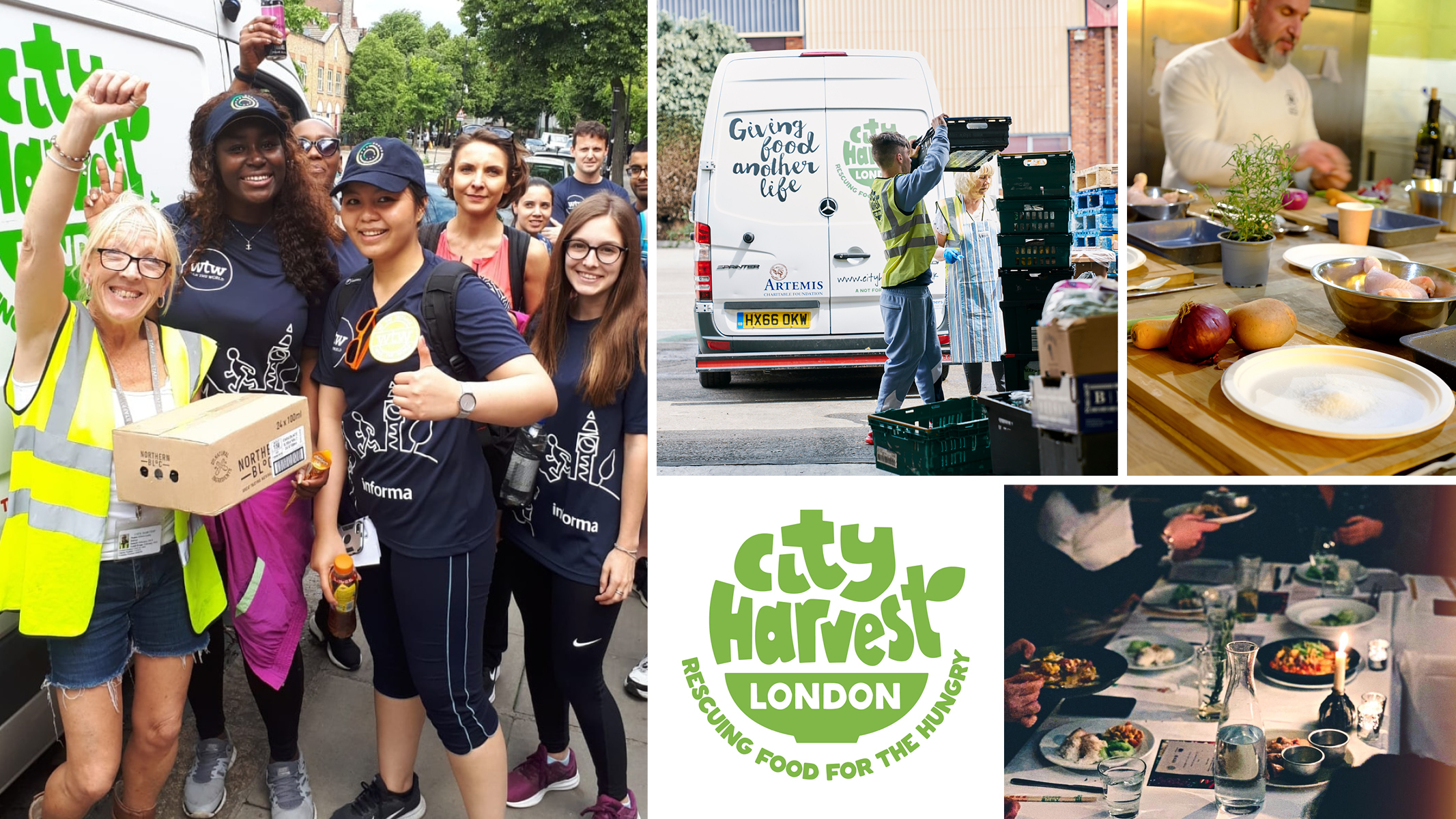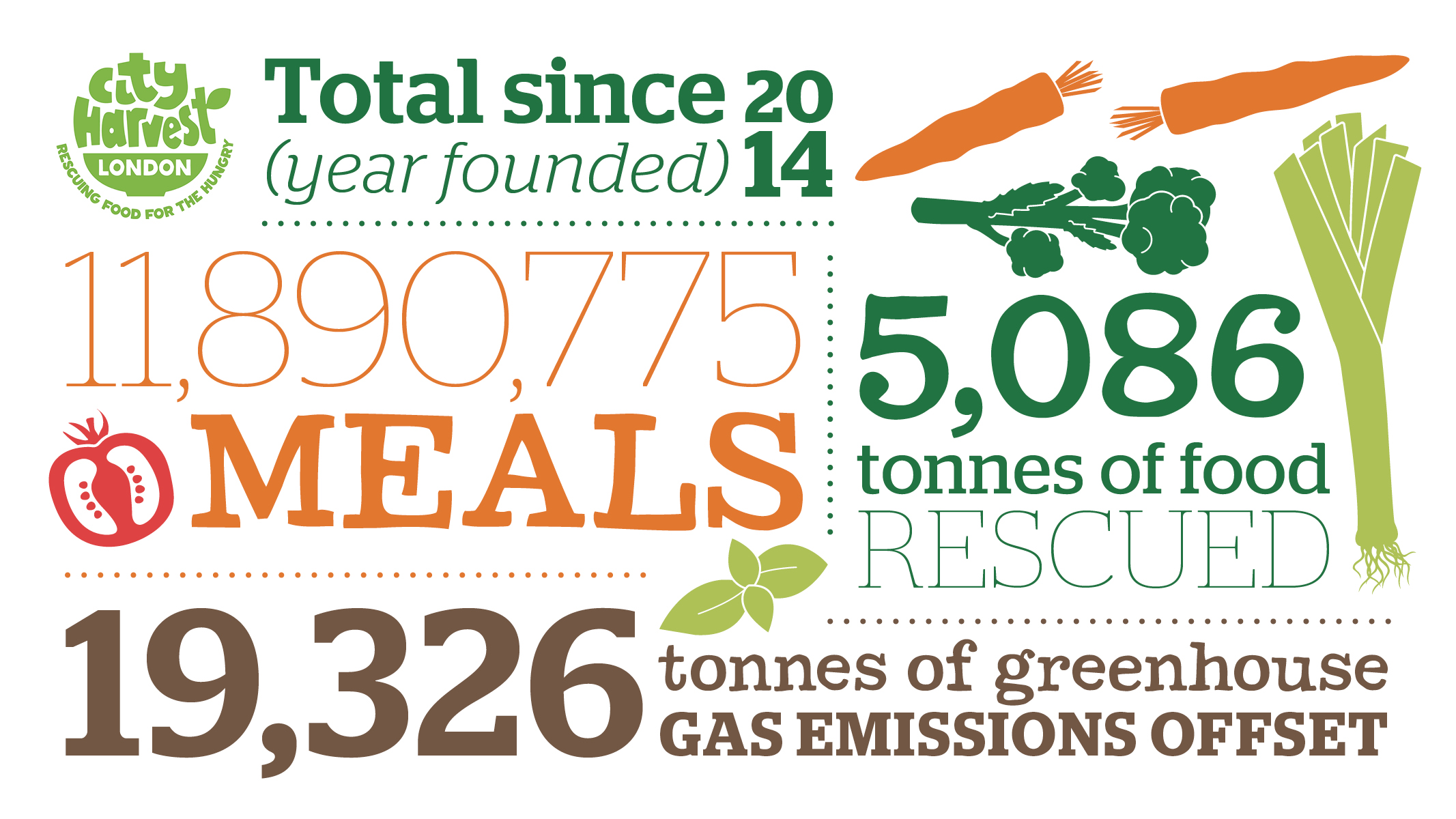We’re proud to support food waste fighting heroes City Harvest, ensuring any surplus fruit, veg and food close to its expiry date finds a good home, avoids landfill and gets to those who need it. Since launching in 2014, City Harvest London has rescued 10 million meals, and in lockdown alone has delivered 1 million to people facing food poverty.
Fighting food waste with City Harvest

Who is City Harvest?
City Harvest is a registered charity operating across London from warehouses in Acton and New Spitalfields. Their goal? To put surplus food to use in a sustainable way by distributing it to organisations around London that feed the hungry. Their refrigerated fleet of vans collects food from supermarkets, restaurants, manufacturers and other food businesses, and distributes it to any community program that serves meals to vulnerable people.
Through the work of City Harvest London, people from over 300 organisations facing obstacles including food poverty, homelessness, and domestic abuse will have access to a nutritious meal. To date, they have served over 11,890,775 meals worth of food to Londoners and have prevented over 19,326 tonnes of greenhouse gas emissions .

We caught up with Laura at City Harvest, asking her what makes City Harvest unique?
“City Harvest was founded in 2014 by a group of American ex-pats including our current CEO, Laura Winningham, and Chairman, Steve Winningham. Laura, Steve, and Bruce saw first-hand the incredible impact that surplus food could have on the lives of individuals when they worked with City Harvest in New York. When they relocated to London, they saw that the same issues of waste and want existed but there was no last-mile food redistribution in operation in the city. They decided to launch London’s first surplus food redistribution charity with one borrowed van named Betty, one driver, and one food donor."
“Aside from being London’s first last-mile food redistribution charity, we’re committed to improving our community through strong relationships with our charity partners, donors, and volunteers. Many of the employees at City Harvest have struggled with homelessness or food insecurity themselves, which makes our team even more passionate about helping London’s most vulnerable. All employees are paid a London Living Wage which is part of our commitment to ensuring that no one is put into food insecurity through low wages. The care we put into every facet of the organisation is visible to volunteers, donors, and employees. “
“I love and enjoyed volunteering at City Harvest; all the staff are very friendly, also the volunteers. The atmosphere is very homely. We are like a family. I enjoy going there each time. I would go more often if I could. I would encourage anyone to be a volunteer at City Harvest.” - Pam, Volunteer
Can you talk us through a ‘day in the life’ of surplus food that finds its way to you?
“Donors (like Abel & Cole) will call or email us when they realise they have either short-dated or slow-moving stock. They can then arrange a collection with our food team and the driver comes at a convenient time, directly to their offices or warehouses. The driver then takes the donation either back to the warehouse for sorting (depending on the products and the dates) or directly out to our charity partners.
If the products come back to our depot, our incredible team of volunteers sort the food by type and date and put it into storage. If the products are perishable, showing that day’s date on them, they will be frozen down in our blast freezers to extend the life for a further month – further reducing potential waste.
Because all the surplus food comes from various sources, we cannot scan products in or out like a supermarket would. This means that none of the food can be pre-allocated. Instead, during the van-loading process the driver’s expertise and knowledge must come in. The drivers go through their list of charities and look at the items available in the warehouse, then hand-select items for each of the charities, keeping in mind the dietary requirements (we have 40% vegan and vegetarian charities and about 100 halal and kosher groups) and restrictions of each organisation - even remembering specific requests, birthdays or events taking place! Once the vans are loaded up with the incredible surplus food the drivers head out on the routes.
Each charity organisation receives a specific number of food trays depending on how many people they serve. The organisations then cook a hot, nutritious meal from the donations for their service users to enjoy. For many of the people using these services, this could be the only hot meal they will have.”
What about the environmental benefits to saving food waste?
“Food waste is a massive contributor to climate change, with food waste making up 8% of all human greenhouse gas emissions. When food goes to landfill it emits methane, a powerful greenhouse gas 25x as potent as CO2. Many companies now have opted to send their surplus food to anaerobic digestion, a process through which ‘biogas’ from decomposing food is harnessed to create biofuel.
While the process minimises emissions, it essentially prevents perfectly edible food surplus being redistributed first to individuals, then to animals for feed, and lastly, only when the food is inedible to anaerobic digestion.
Known as the food waste hierarchy, these steps are an essential part of creating a sustainable food system. This is often overlooked by larger companies who assume that surplus food redistribution is not a viable option either because of costs or labour. City Harvest works diligently to ensure that our collections from food donors are both free and easy, which means that there is no reason why all food manufacturers should not be donating their edible surplus to charity before even contemplating anaerobic digestion.
Beyond emissions, food waste has a myriad of negative effects on the planet. To grow our food, we need a huge amount of land, water, energy, and labour. When food is wasted so are all the resources put into the growing of that food. Land greater than the size of China is used to grow food that is never consumed. By minimising food waste, City Harvest is also tackling land degradation, water waste, and improving the lives of farmers and agricultural workers.”
If your organisation has food to save, contact food@cityharvest.org.uk. For more details and tickets for cooking classes, click here. You can also learn more about supper clubs on their Instagram @cityharvestlondon.
Want to fight food waste close to home? It starts in the kitchen, and we’ve got some great ways to use up every last organic morsel. Remember, it’s not waste until it’s wasted. Check out Jassy’s herb stem vinegar and root veg peel crisps for inspiration.


